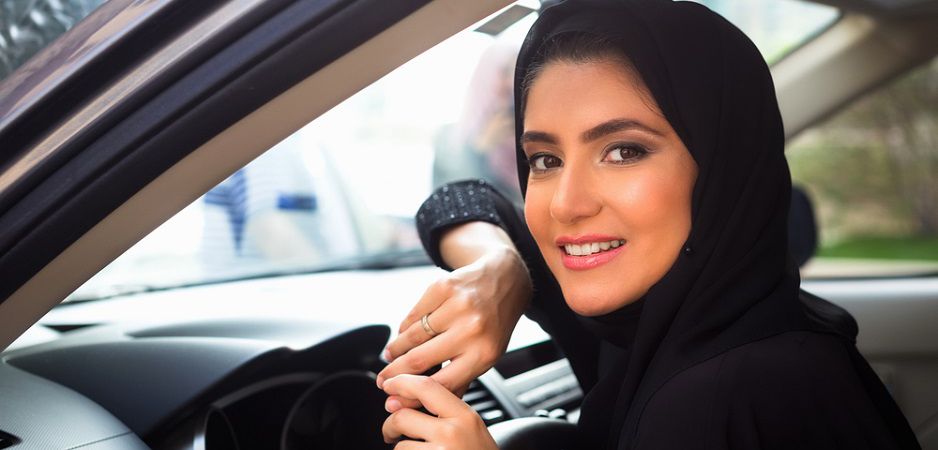Following a decree by King Salman, women in Saudi Arabia can finally get a driving license.
Saudi Arabia’s long-awaited lifting of a ban on women driving will likely serve as a litmus test for Crown Prince Mohammed bin Salman’s ability to introduce economic and social reforms despite conservative opposition. It also distracts attention from international criticism of the kingdom’s war in Yemen and charges by human rights groups as well as some Muslim leaders that Saudi Arabia is fostering sectarianism and prejudice against non-Muslims.
If the recent national day celebrations — in which women were for the first time allowed to enter a sports stadium — are anything to go by, opposition is likely to be limited to protests on social media. To be sure, thousands welcomed this move as well as the lifting of the driving ban. Saudi media reported that senior Islamic scholars, who for decades opposed expanding women’s rights and some of whom have criticized Prince Mohammed’s efforts to expand entertainment opportunities in the kingdom, said they saw no religious objection to women driving.
Conservatives, however, have made their rejection of enhancing women’s rights in response to the national day celebrations. “Patriotism does not mean sin. Of course, what is happening does not please God and his prophet. Patriotism is not dancing, free mixing, losing decency and playing music. What strange times,” said one critic on Twitter. A video of a man telling celebrating crowds that they have “no shame, no religion, no tribe” was widely shared on social media. Hundreds of thousands of Saudis used an Arabic hashtag demanding the restoration of powers to the kingdom’s religious police, whose ability to strictly enforce ultraconservative Sunni Muslim moral codes was curbed in 2016.
A 24-year-old Saudi student, speaking earlier this year to The Guardian, noted that ultraconservatism maintains a hold on significant numbers of young people. “You know that the top 11 Twitter handles here are Salafi clerics, right? We are talking more than 20 million people who hang on their every word. They will not accept this sort of change. Never.”
Talal Salama, a Saudi singer, was attacked on social media this week for singing a text from the Quran during the national day celebrations. “The disaster is not just that he is sitting singing the Quran, the disaster is that it was a party approved by the government that is allowing him to sing, said lawyer Musleh al-Udayni on Twitter.
CONSERVATIVES IN A CONSERVATIVE NATION
Prior to the driving ban reversal, Saudi authorities prevented Saad al-Hijri, head of fatwas (religious legal opinions) in the Asir governorate, from preaching. He previously declared that women should not drive because their brains shrink to a quarter the size of a man’s when they go shopping. The suspension was the latest measure in a crackdown in which scores of Islamic scholars, including some of the kingdom’s most popular ones, judges and intellectuals, were arrested. The arrests were likely made to ensure that conservative opposition to the lifting of the driving ban would be muted.
The kingdom’s decision to delay implementation of the decision until June 2018 gives the government time to neutralize opposition and serves as an indication of what it would take to ensure Saudi women’s rights. To enforce the policy shift, Saudi Arabia must first eliminate bureaucratic, legal and social hurdles that prevent women from obtaining driving licenses, create facilities for women to learn how to drive, and train policemen to interact with female drivers in a country that enforces gender segregation and in which men largely interact only with female relatives.
The lifting of the ban is part of Prince Mohammed’s Vision 2030 plan, which seeks to diversify and streamline the economy and introduce limited social reform but avoid political liberalization. With women accounting for half of the Saudi population and more than half of its university graduates, Vision 2030 indicates the limits on granting women’s rights by saying that women will account for only 30% of a reformed kingdom’s workforce.
While the lifting of the driving ban, which was issued in a decree by King Salman on September 26, allows women to apply for a license without the permission of their male guardian, the principle of male guardianship that subjects women to the will of their menfolk remains in place. There is also no indication that last week’s use of a stadium as a test case will lead to a lifting of restrictions on women’s sporting rights, including free access to attend men’s competitions and the ability to practice and compete in a majority of sports disciplines that are not mentioned in the Quran.
The public relations value of the reversal on the driving ban was evident in the fact that it temporarily drew attention away from news that reflected badly on the kingdom, including mounting international criticism of Saudi conduct of its war in Yemen that has pushed that country to the edge of the abyss. Saudi Arabia has desperately been seeking to avert censorship of a United Nations resolution and defeat calls for an independent investigation.
HUMAN RIGHTS WATCH REPORT
Riyadh has also put on the news backburner a 62-page report by Human Rights Watch that, despite the banning of al-Hijri, documented that Saudi Arabia has “permitted government-appointed religious scholars and clerics to refer to religious minorities in derogatory terms or demonize them in official documents and religious rulings, which influence government decision-making.” Anti-Shia, anti-Sufi, anti-Christian and anti-Jewish sentiment is evident in the Saudi education system and in the judiciary, the report published on said.
Saudi Arabia adheres to a puritan interpretation of Islam that views Shia Muslims as heretics and advocates avoidance by Muslims of non-Muslims. The kingdom has spent an estimated $100 billion in the last four decades to propagate its austere vision of Islam in a bid to establish itself as the leader of the Muslim world and to counter the revolutionary appeal of Iran following the 1979 Islamic Revolution. In doing so, it has contributed to Muslim societies like Malaysia and Indonesia becoming more conservative and intolerant toward minorities. Saudi ultraconservative influence was visible earlier this week when an owner of a self-service launderette in the Malaysian state of Johor banned non-Muslims from using his services.
“Saudi Arabia has relentlessly promoted a reform narrative in recent years, yet it allows government-affiliated clerics and textbooks to openly demonize religious minorities such as Shia. This hate speech prolongs the systematic discrimination against the Shia minority and — at its worst — is employed by violent groups who attack them,” said Sarah Leah Whitson, Middle East director at Human Rights Watch.
The views expressed in this article are the author’s own and do not necessarily reflect Fair Observer’s editorial policy.
Photo Credit: clicksahead / Shutterstock.com
Support Fair Observer
We rely on your support for our independence, diversity and quality.
For more than 10 years, Fair Observer has been free, fair and independent. No billionaire owns us, no advertisers control us. We are a reader-supported nonprofit. Unlike many other publications, we keep our content free for readers regardless of where they live or whether they can afford to pay. We have no paywalls and no ads.
In the post-truth era of fake news, echo chambers and filter bubbles, we publish a plurality of perspectives from around the world. Anyone can publish with us, but everyone goes through a rigorous editorial process. So, you get fact-checked, well-reasoned content instead of noise.
We publish 3,000+ voices from 90+ countries. We also conduct education and training programs
on subjects ranging from digital media and journalism to writing and critical thinking. This
doesn’t come cheap. Servers, editors, trainers and web developers cost
money.
Please consider supporting us on a regular basis as a recurring donor or a
sustaining member.
Will you support FO’s journalism?
We rely on your support for our independence, diversity and quality.







